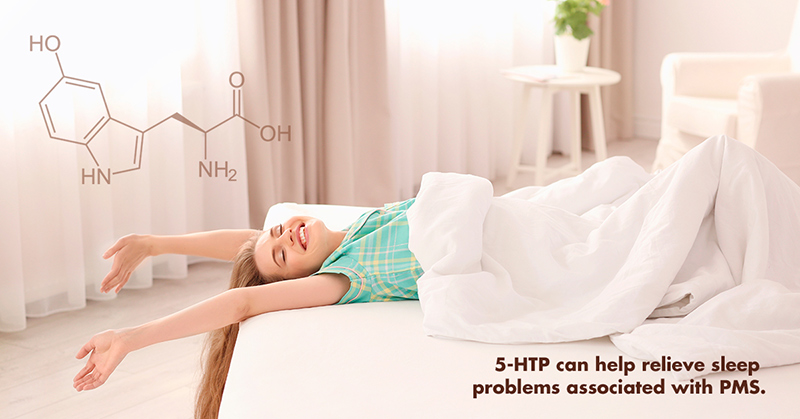For PMS, 5-HTP works to increase serotonin production which can alleviate symptoms of premenstrual depression, anxiety and sleeplessness. 5-Hydroxytryptophan (5-HTP) is produced in the body from the essential amino acid L-tryptophan. An amino acid is “essential” when it cannot be made in the body and must come from food or supplementation. Taking 5-HTP as a supplement gives the central nervous system a crucial building block with which to produce more serotonin.
 Once in the brain, tryptophan is converted to the neurotransmitter serotonin which plays a large role in mood creating a feeling of well-being and relaxation. Tryptophan is a large amino acid and competes with all of the body’s other amino acids to enter the brain through a strict gatekeeper known as the blood-brain barrier. Carbohydrates–which some people crave during PMS–trigger the release of insulin, which removes most amino acids from the blood, but not tryptophan. This clears the pathway for tryptophan to enter the brain and form serotonin and, ultimately, melatonin. Women with ovulatory menstrual cycles have a circadian rhythm superimposed on the menstrual-associated rhythm; in turn, menstrual events affect the circadian rhythm often leading to insomnia.2 Melatonin is formed from 5-HTP, and is often low in women with PMS, and especially in premenstrual dysphoric disorder (PMDD) which includes severe symptoms of depression, tension, and irritability for 1 to 2 weeks before periods. Research has found that women with PMDD have lower night time melatonin levels in general, and these drop even further in the premenstrual week: 5-HTP has been shown to be an excellent remedy.
Once in the brain, tryptophan is converted to the neurotransmitter serotonin which plays a large role in mood creating a feeling of well-being and relaxation. Tryptophan is a large amino acid and competes with all of the body’s other amino acids to enter the brain through a strict gatekeeper known as the blood-brain barrier. Carbohydrates–which some people crave during PMS–trigger the release of insulin, which removes most amino acids from the blood, but not tryptophan. This clears the pathway for tryptophan to enter the brain and form serotonin and, ultimately, melatonin. Women with ovulatory menstrual cycles have a circadian rhythm superimposed on the menstrual-associated rhythm; in turn, menstrual events affect the circadian rhythm often leading to insomnia.2 Melatonin is formed from 5-HTP, and is often low in women with PMS, and especially in premenstrual dysphoric disorder (PMDD) which includes severe symptoms of depression, tension, and irritability for 1 to 2 weeks before periods. Research has found that women with PMDD have lower night time melatonin levels in general, and these drop even further in the premenstrual week: 5-HTP has been shown to be an excellent remedy.
First-line therapy for PMDD often includes a pharmaceutical SSRI, a serotonin reuptake inhibitor. SSRI’s effectively raise the amount of serotonin that the body perceives is present. Taking a natural supplement of 5-HTP can produce a similar effect, alleviating symptoms of depression, anxiety and sleeplessness. Clinically we see it being very helpful for all of these symptoms, and scientific literature continues to support its use. A systematic review of 5-HTP treatment for depression confirmed that available evidence indicates that 5-HTP is better than placebo at alleviating menstrual depression.7
5-HTP is obtained commercially from the seeds of Grifonia simplicifolia, which is a tropical shrub native to West Africa. Tryptophan is also used by the body to make niacin, a B-vitamin that is important for digestion, skin, and nerves; important in that those areas if irritated, can also cause low mood or insomnia. A deficiency in tryptophan may reduce sleep, appetite, and affect temperature, sexual behavior, pain sensation, depression, anxiety, and aggression which coincides foots with earlier studies that found insomnia sufferers have tryptophan depletion. The results suggest a negative impact of tryptophan depletion on sleep continuity, and a benefit from taking 5-HTP on measures of REM sleep.1
Recommendations:
100-300mg nightly, or as directed by your healthcare provider.
References
- Riemann, Dieter, Bernd Feige, Magdolna Hornyak, Stephanie Koch, Fritz Hohagen, and Ulrich Voderholzer. “The tryptophan depletion test: impact on sleep in primary insomnia—a pilot study.” Psychiatry Research 109, no. 2 (2002): 129-135.
- Baker FC, Driver HS. Circadian rhythms, sleep and the menstrual cycle. Sleep Med. 2007 Sep;8(6):613-22. Epub 2007 Mar 26.
- Birdsall TC. 5-Hydroxytryptophan: A Clinically-Effective Serotonin Precursor. Altern Med Rev 1998;3:271-80.
- Jehan S et al. Sleep and Premenstrual Syndrome. J Sleep Med Disord. 2016;3(5). Epub 2016 Aug 3.
- Reid RL, Soares CN. Premenstrual Dysphoric Disorder: Contemporary Diagnosis and Management. J Obstet Gynaecol Can. 2018 Feb;40(2):215-223. Epub 2017 Nov 11.
- Schechter A et al. Pilot investigation of the circadian plasma melatonin rhythm across the menstrual cycle in a small group of women with premenstrual dysphoric disorder. PLoS One. 2012;7(12):e51929. Epub 2012 Dec 19.
- Shaw K, Turner J, Del Mar C. Tryptophan and 5-hydroxytryptophan for depression. Cochrane Database Syst Rev 2002;(1):CD003198.
- Shinohara K et al. Menstrual changes in sleep, rectal temperature and melatonin rhythms in a subject with premenstrual syndrome. Neurosci Lett. 2000 Mar 10;281(2-3):159-62.
- U.S. Food and Drug Administration Pharmacy Compounding Advisory Committee meeting June 17-18, 2015. Available at: www.fda.gov/downloads/advisorycommittees/committeesmeetingmaterials/drugs/pharmacycompoundingadvisorycommittee/ucm455276.pdf (accessed 8/21/15).